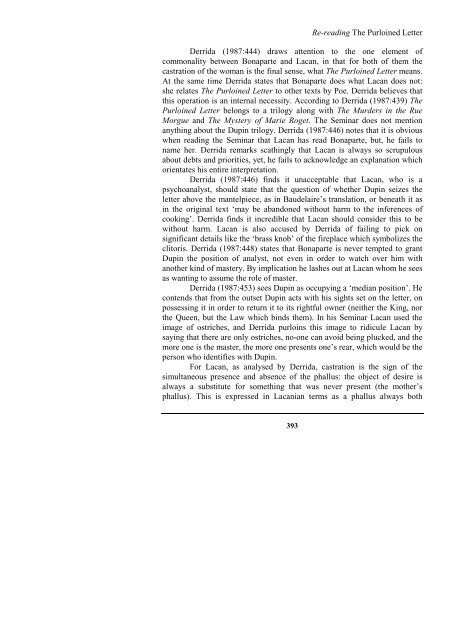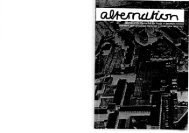Re-reading The Purloined Letter - Alternation Journal
Re-reading The Purloined Letter - Alternation Journal
Re-reading The Purloined Letter - Alternation Journal
You also want an ePaper? Increase the reach of your titles
YUMPU automatically turns print PDFs into web optimized ePapers that Google loves.
393<br />
<strong>Re</strong>-<strong>reading</strong> <strong>The</strong> <strong>Purloined</strong> <strong>Letter</strong><br />
Derrida (1987:444) draws attention to the one element of<br />
commonality between Bonaparte and Lacan, in that for both of them the<br />
castration of the woman is the final sense, what <strong>The</strong> <strong>Purloined</strong> <strong>Letter</strong> means.<br />
At the same time Derrida states that Bonaparte does what Lacan does not:<br />
she relates <strong>The</strong> <strong>Purloined</strong> <strong>Letter</strong> to other texts by Poe. Derrida believes that<br />
this operation is an internal necessity. According to Derrida (1987:439) <strong>The</strong><br />
<strong>Purloined</strong> <strong>Letter</strong> belongs to a trilogy along with <strong>The</strong> Murders in the Rue<br />
Morgue and <strong>The</strong> Mystery of Marie Roget. <strong>The</strong> Seminar does not mention<br />
anything about the Dupin trilogy. Derrida (1987:446) notes that it is obvious<br />
when <strong>reading</strong> the Seminar that Lacan has read Bonaparte, but, he fails to<br />
name her. Derrida remarks scathingly that Lacan is always so scrupulous<br />
about debts and priorities, yet, he fails to acknowledge an explanation which<br />
orientates his entire interpretation.<br />
Derrida (1987:446) finds it unacceptable that Lacan, who is a<br />
psychoanalyst, should state that the question of whether Dupin seizes the<br />
letter above the mantelpiece, as in Baudelaire’s translation, or beneath it as<br />
in the original text ‘may be abandoned without harm to the inferences of<br />
cooking’. Derrida finds it incredible that Lacan should consider this to be<br />
without harm. Lacan is also accused by Derrida of failing to pick on<br />
significant details like the ‘brass knob’ of the fireplace which symbolizes the<br />
clitoris. Derrida (1987:448) states that Bonaparte is never tempted to grant<br />
Dupin the position of analyst, not even in order to watch over him with<br />
another kind of mastery. By implication he lashes out at Lacan whom he sees<br />
as wanting to assume the role of master.<br />
Derrida (1987:453) sees Dupin as occupying a ‘median position’. He<br />
contends that from the outset Dupin acts with his sights set on the letter, on<br />
possessing it in order to return it to its rightful owner (neither the King, nor<br />
the Queen, but the Law which binds them). In his Seminar Lacan used the<br />
image of ostriches, and Derrida purloins this image to ridicule Lacan by<br />
saying that there are only ostriches, no-one can avoid being plucked, and the<br />
more one is the master, the more one presents one’s rear, which would be the<br />
person who identifies with Dupin.<br />
For Lacan, as analysed by Derrida, castration is the sign of the<br />
simultaneous presence and absence of the phallus: the object of desire is<br />
always a substitute for something that was never present (the mother’s<br />
phallus). This is expressed in Lacanian terms as a phallus always both

















